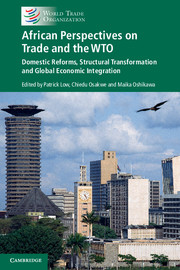 African Perspectives on Trade and the WTO
African Perspectives on Trade and the WTO Book contents
- African Perspectives on Trade and the WTO
- African Perspectives on Trade and the WTO
- Copyright page
- Contents
- Figures
- Plates
- Contributors
- Message
- Joint Foreword
- Book part
- Glossary
- Disclaimer
- 1 Introduction and Overview
- Part I The Future of the Multilateral Trading System: Perspectives from African Policy-Makers and Partners
- Part II Africa’s Participation in the Rules-Based Multilateral Trading System
- 10 Rising Africa in World Trade? A Story of Traditional Commodities and New Products
- 11 Trade Policy Trends in Africa: Empirical Evidence from Twenty Years of WTO Trade Policy Reviews
- 12 Preferential Trade Agreements in Africa: Lessons from the Tripartite Free Trade Agreements and an African Continent-Wide FTA
- 13 African Trade Integration and International Production Networks
- 14 Implementing Trade Facilitation Reform in Africa
- Part III Selected Development Experiences and Perspectives
- Book part
- Index
- Plate Section (PDF Only)
- Book part
- References
14 - Implementing Trade Facilitation Reform in Africa
from Part II - Africa’s Participation in the Rules-Based Multilateral Trading System
Published online by Cambridge University Press: 27 October 2016
- African Perspectives on Trade and the WTO
- African Perspectives on Trade and the WTO
- Copyright page
- Contents
- Figures
- Plates
- Contributors
- Message
- Joint Foreword
- Book part
- Glossary
- Disclaimer
- 1 Introduction and Overview
- Part I The Future of the Multilateral Trading System: Perspectives from African Policy-Makers and Partners
- Part II Africa’s Participation in the Rules-Based Multilateral Trading System
- 10 Rising Africa in World Trade? A Story of Traditional Commodities and New Products
- 11 Trade Policy Trends in Africa: Empirical Evidence from Twenty Years of WTO Trade Policy Reviews
- 12 Preferential Trade Agreements in Africa: Lessons from the Tripartite Free Trade Agreements and an African Continent-Wide FTA
- 13 African Trade Integration and International Production Networks
- 14 Implementing Trade Facilitation Reform in Africa
- Part III Selected Development Experiences and Perspectives
- Book part
- Index
- Plate Section (PDF Only)
- Book part
- References
Summary
Trade facilitation is central to Africa’s competitiveness in the global economy. Costs related to trade facilitation make up a significant proportion of overall trade-related costs, which in Africa are higher than in any other developing region. This acts as a barrier for the integration of African countries into global markets, as well as greater intra-African integration. Improving trade facilitation is essential for lowering costs for African agricultural producers as well as supporting the development of higher value-added activities in agribusiness, manufacturing, and services, including participation in regional and global value chains. Diagnostic tools used by the World Bank Group, such as the Logistics Performance Index, as well as country-specific diagnostics, highlight the key challenges faced. The evidence also shows that performance varies, with some countries making significant progress on reform programs to improve trade facilitation. With other developing regions having generally more advanced trade facilitation regimes, the lessons from these regions can be instructive in designing and implementing reforms in Africa, which the World Bank Group is actively supporting at the national and regional levels. A priority for the Bank Group is implementing trade facilitation programs that do more to reduce trade-related costs facing the extreme poor, given the concentration of extreme poverty in Africa.
- Type
- Chapter
- Information
- African Perspectives on Trade and the WTODomestic Reforms, Structural Transformation and Global Economic Integration, pp. 295 - 314Publisher: Cambridge University PressPrint publication year: 2016


